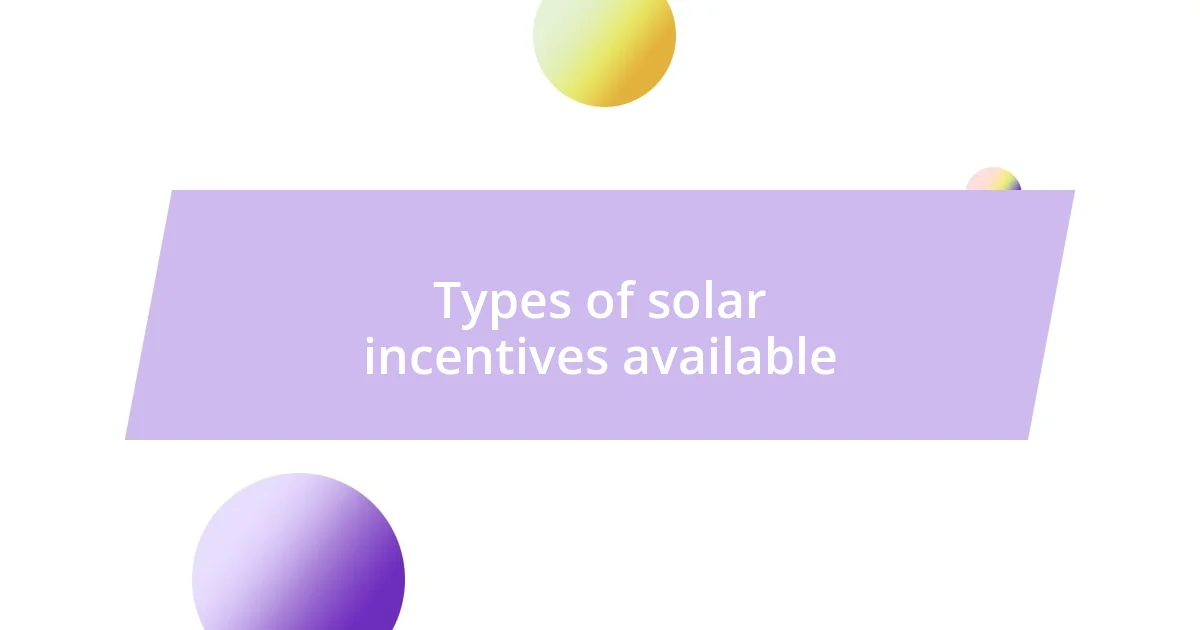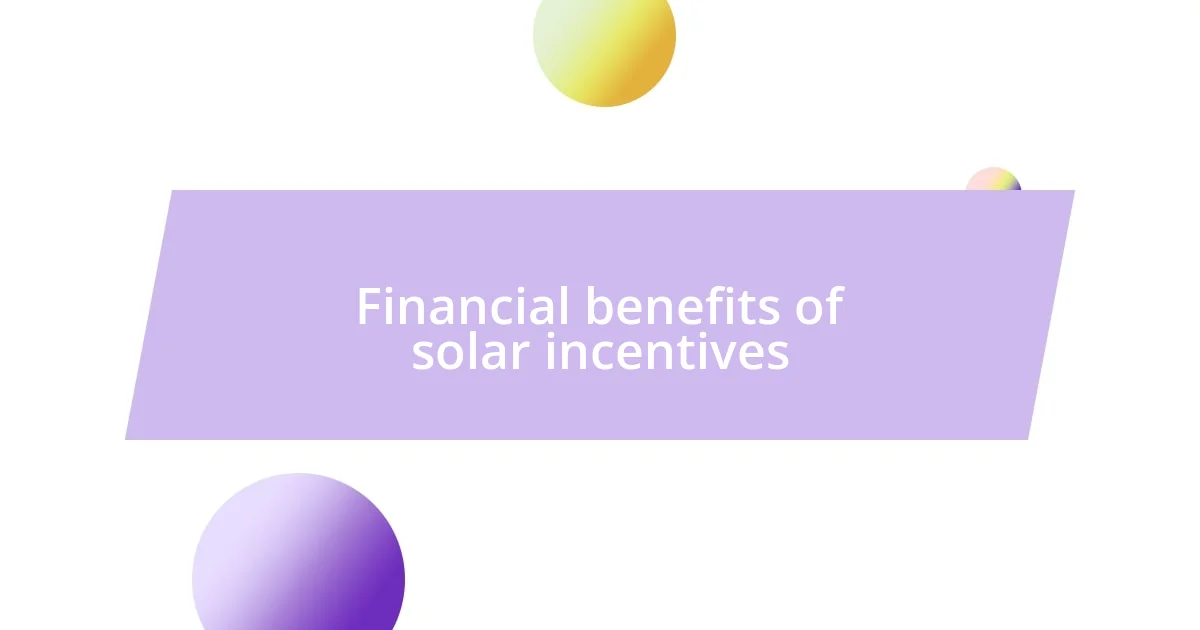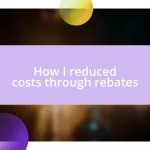Key takeaways:
- Massachusetts offers robust solar incentives, including the SMART Program, ITC, and SRECs, making solar energy financially appealing for homeowners.
- Solar incentives considerably reduce installation costs and monthly energy bills, transforming financial burdens into savings and potential income from energy production.
- Real-life success stories showcase the positive impact of solar incentives on families and businesses, reinforcing the financial and environmental benefits of going solar.

Understanding solar incentives in Boston
Solar incentives in Boston can be a game changer for homeowners. When I first looked into installing solar panels, I was amazed at how many financial programs existed to support the transition to renewable energy. Did you know that the state offers significant rebates and tax credits that can substantially lower the upfront costs?
As I navigated through these incentives, I found that Massachusetts has one of the most robust solar programs in the country. The Solar Massachusetts Renewable Target (SMART) program, for instance, not only encourages solar adoption but also allows participants to receive payment for the electricity they produce. It felt empowering to know that I could contribute to cleaner energy while also receiving financial benefits.
However, the landscape of solar incentives can be overwhelming at first. There are numerous local and federal options available, each with its own eligibility requirements. Have you ever felt that way when looking at government programs? I certainly did! But once I dug deeper and grasped the nuances, I realized these incentives make solar not just a moral choice, but a financially sound one as well.

Types of solar incentives available
Understanding the types of solar incentives can really clear up some confusion. I remember feeling lost when I first started, but breaking these down helped me feel more at ease. Here’s a closer look at what’s available to Boston residents:
- Federal Investment Tax Credit (ITC): This offers a significant tax credit equal to 26% of the installed cost of the solar system.
- Massachusetts Solar Renewable Energy Certificates (SRECs): Homeowners can earn certificates for each megawatt-hour of electricity their system produces, which can be sold for additional income.
- SMART Program: A unique initiative that provides monthly payments based on energy production, rewarding you for every kilowatt-hour generated.
- Mass Save Rebates: Upfront rebates can help reduce the initial costs of purchasing a solar system.
- Property Tax Exemption: In Massachusetts, the added value of your solar installation is exempt from property taxes, meaning more savings in your pocket.
When I finally compared these incentives, it was like turning on a light bulb for me. Each program interconnects, creating a web of financial support. I felt a sense of relief knowing that my decision to go solar wasn’t just about being environmentally conscious; it was also a smart financial move. The combination of these incentives truly made my investment feasible and realistic.

Financial benefits of solar incentives
When I think about the financial benefits of solar incentives in Boston, I can’t help but remember the moment I saw my first electric bill after installing my solar panels. It was like uncovering a small treasure: my bill had plummeted! These incentives not only help cover the installation costs but also assert their value over time by significantly reducing monthly energy expenses. Additionally, rebates and tax credits from the state and federal government can help lessen that initial financial burden, making solar more accessible than ever.
Another aspect I found fascinating is the income potential from selling Solar Renewable Energy Certificates (SRECs). This allowed me to earn money based on the electricity my system generated. It felt rewarding to know each unit of energy I created earned me both sustainability points and a financial return. The financial flowchart of incentives, production payments, and savings quickly transformed my home from a simple living space into a financial asset.
The combination of immediate rebates and ongoing savings composes a compelling financial strategy. I remember feeling a surge of empowerment realigning my energy costs with a proactive solution. With every kilowatt-hour produced, I wasn’t just contributing to cleaner energy; I was also enriching my wallet. After feeling the impact of these incentives firsthand, it became clear that going solar is not just an environmental decision but a powerful financial move as well.
| Incentive Type | Financial Benefit |
|---|---|
| Federal Investment Tax Credit (ITC) | Tax credit equal to 26% of installation cost |
| Massachusetts Solar Renewable Energy Certificates (SRECs) | Income from selling certificates based on energy produced |
| SMART Program | Monthly payments for electricity generated |
| Mass Save Rebates | Upfront rebates to lower installation costs |
| Property Tax Exemption | Exemption on increased property value from solar installation |

Case studies on solar incentives
When I read about the success stories of Boston homeowners who took advantage of solar incentives, I felt a connection to their journeys. For instance, one family reported that after installing solar panels, not only did their monthly electricity bills decrease dramatically, but they also earned thousands from SREC sales. Can you imagine the sense of accomplishment they must have felt seeing their investment literally pay off, month after month? It’s stories like this that inspire me to share the potential of going solar.
Another case that stood out involved a small business in downtown Boston. They utilized the SMART Program and, within just a few months, started receiving monthly payments that helped offset their operational costs. It was fascinating to see how a simple decision to go solar created a new revenue stream for them. I can envision the relief they felt, knowing they could allocate those funds for growth rather than solely paying utility bills.
Lastly, I recall a couple who took advantage of the Mass Save Rebates to get their solar system installed. They described feeling nervous about the upfront costs initially, yet the immediate savings softened their worries. Hearing them talk about how their initial fear gave way to a growing sense of security and sustainability reinforced my belief in the transformative power of solar incentives. Have you ever made a financial decision that initially felt daunting but turned into a source of pride? That’s the kind of shift these incentives can foster for many.














